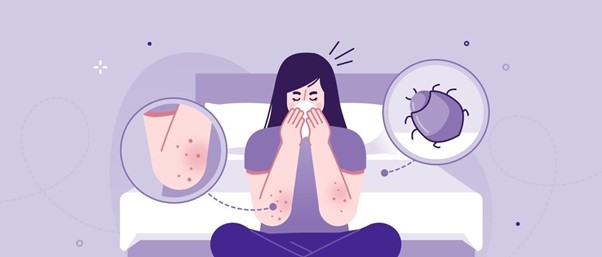
Allergies can cause a wide range of symptoms, from itchy eyes and sneezing to coughing. Unfortunately, allergy-related issues can also affect your sleep quality.
This is because allergies flare up at night when the body’s natural defenses are weakest. As a result, you may struggle to fall asleep or stay asleep due to the discomfort caused by your symptoms.
In this article, we’ll discuss how allergies can affect sleep and provide strategies for getting a good night’s rest despite your allergy symptoms.
Causes of Allergy-related Sleep Problems
Following are some of the common causes of allergy-related sleep problems and what you can do about them.
Nasal Congestion
Nasal congestion is one of the most common allergy-related symptoms that can affect your sleep quality. Congestion makes it challenging to breathe correctly while you’re sleeping, leading to snoring, wheezing, and other breathing problems.
If you’re experiencing nasal congestion, try using a saline nasal spray before going to bed or keeping your head elevated during sleep.
Itchy Eyes
Itchy or watery eyes are another common allergy symptom that can trigger sleep disruptions.
Rubbing or itching your eyes frequently can lead to eye strain and discomfort, making it challenging to fall and stay asleep.
You can relieve eye itchiness by using eye drops or applying a cold compress to your eyes.
Coughing
Allergy-related coughing can make it difficult to sleep, leading to irritation and inflammation of your throat. While coughing frequently is a natural way for your body to eliminate allergens and irritants, too much coughing can lead to sleeping troubles.
Over-the-counter cough suppressants and anti-inflammatory medications can help relieve allergy-related coughing and improve your sleep quality.
Wheezing
Wheezing is a symptom that affects the airways and can make breathing more challenging, leading to sleep disturbances.
If you’re experiencing wheezing, asthma medications and controlling your exposure to allergens can help relieve this symptom and improve your sleep quality.
Restless Leg Syndrome (RLS)
RLS is a common sleep disorder that can affect people with allergies. It’s characterized by an uncomfortable sensation or urge to move your legs, leading to disruptions to sleep.
Treating the underlying allergies causing RLS can alleviate this symptom, and over-the-counter pain relievers like acetaminophen can provide relief.
Other Factors
Other factors such as temperature, humidity, and smoke can also trigger allergy symptoms and exacerbate existing issues.
In addition, some medications used to treat allergies can cause drowsiness and make it more difficult to stay asleep throughout the night.
Strategies to Improve Sleep Quality Despite Allergies
If you suffer from allergies, there are several strategies you can use to improve your sleep quality.
Avoiding Triggers in Your Bedroom Environment
First, it’s important to identify the allergens that trigger your symptoms and try to reduce their presence in your bedroom environment.
This means removing any items such as carpets, stuffed animals, or bedding that might contain dust mites. You should also make sure to keep your bedroom free from smoke, pollen, and pet dander.
If you are allergic to mold, it’s important to ensure your home is well-ventilated and regularly cleaned with a damp cloth.

Taking Medication as Prescribed by Your Doctor
If you suffer from allergies, it’s important to take any medications prescribed by your doctor as directed.
This will help to reduce any inflammation and alleviate your symptoms, making it easier to fall asleep and stay asleep.
Creating an Ideal Sleeping Space for Restful Sleep
In addition, creating an ideal sleeping environment can help you sleep better despite your allergies.
For example, using a mattress protector and hypoallergenic bedding can help reduce the presence of allergens and dust mites in your bedroom.
You should also make sure your room is cool and dark, as these conditions signal to your body that it’s time to rest.
Invest in An Air Purifier
An air purifier can help eliminate allergens from the air. Look for one that has a HEPA filter, as they are best for removing pollen, dust mites, and pet dander.
Shower Before Bed
Showering before bed can help remove allergens from your skin and hair. This means you’ll be less likely to transfer allergens to your bedding while you sleep.
Use a Saline Nasal Spray
A saline nasal spray can help rinse out allergens from your nasal passages, reducing inflammation and congestion.
Close Windows And Doors at Night
Keeping windows and doors closed at night can help prevent pollen and other outdoor allergens from making their way into your bedroom.
Adjust The Humidity
High humidity levels can make allergies worse, as dust mites thrive in moist environments. Use a dehumidifier to keep the humidity below 50%.
Use an Anti-allergy Pillow
An anti-allergy pillow can help prevent allergens from getting trapped in your pillow and triggering allergy symptoms.
Wash Your Bedding Regularly
Washing your bedding regularly is important to remove allergens that accumulate over time. Wash your bedding in hot water to kill any allergens that are present.

Avoid Eating Before Bed
Eating before bed can increase acid reflux, which can make allergies worse. Try to avoid eating for at least three hours before bedtime.
Natural Remedies to Help Alleviate Symptoms Before Bedtime
Finally, you can try natural remedies such as aromatherapy, yoga, or meditation to help alleviate your symptoms before bedtime.
Aromatherapy can be used to reduce inflammation and open up airways, while gentle stretching through yoga or meditation can help relax the body and mind.
Conclusion
Allergies can make it difficult to get a good night’s rest due to the discomfort caused by symptoms such as congestion.
However, by avoiding triggers in your bedroom environment, taking medication as prescribed, and creating an ideal sleeping space, you can improve your sleep quality despite your allergies.
Additionally, natural remedies such as aromatherapy, yoga, and meditation can help alleviate symptoms before bedtime to ensure a good night’s rest.
By following these strategies, you will be able to rest easy and enjoy a good night’s sleep. With the right approach, you can find relief from your allergy-related sleep issues and start waking up feeling refreshed every day.
Learn more.